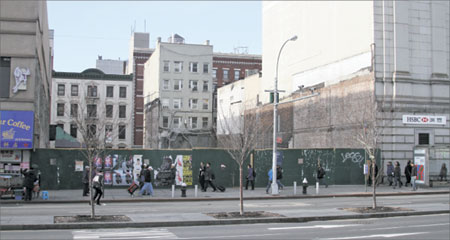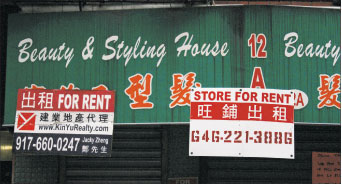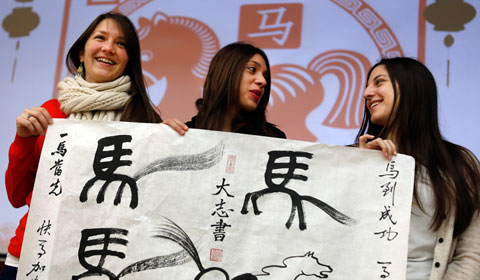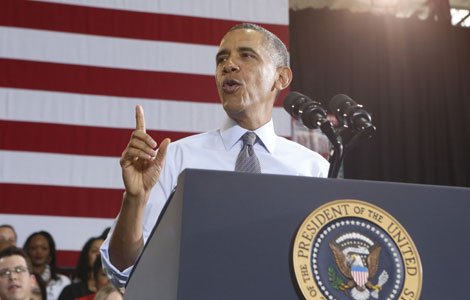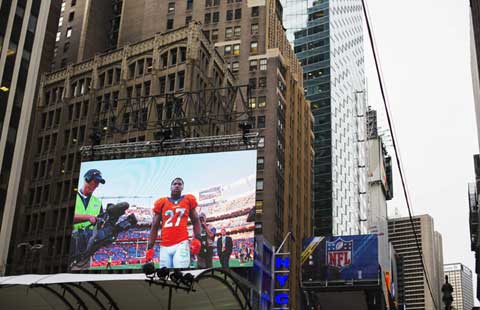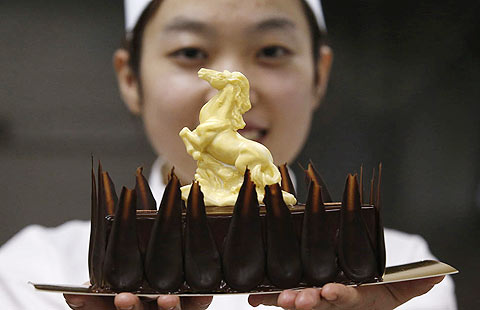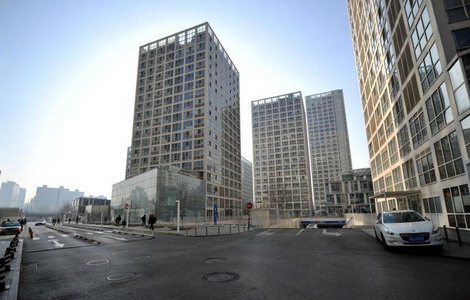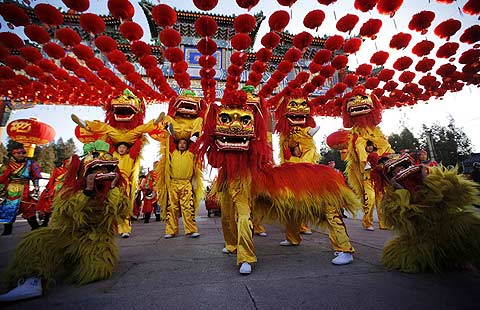NY's Chinatown: 'Cool kids' are coming
Updated: 2014-01-17 14:50
By Amy He (China Daily USA)
|
||||||||
It's "not for everyone',' said a real estate agent about what is happening in the largest enclave of Chinese people in the United States. New businesses and new housing developments are moving in at the fastest pace ever, causing many longtime residents to find that indeed it's not for them, reports Amy He in New York.
At the corner of Mott and Worth streets sits the Hampton's Market Place. Gourmet potato chips like Kettle and Deep River Snacks are next to rows of Chobani Greek yogurt. Three non-Asians eat bagels and listen to music on their iPhones. There are no Asians. There is no Chinese-branded food.
Ten minutes north, New York City building permits cover a green wooden wall. Behind it, rubble that once was the Golden Bridge Chinese restaurant will be replaced by a 22-story hotel by 2015.
In between Hampton's and the would-be hotel site, are blocks of Chinese restaurants, Chinese-owned small businesses, and apartments above them that traditionally have housed large Chinese households. It's the center of historic Chinatown where gentrification has been going on for more than the last decade. But interviews with real estate brokers and residents show it's occurring at a pace not previously experienced, bringing in new businesses and new housing at prices that are pushing out long-time residents and replacing them with younger, affluent professionals.
A two-bedroom, two-bathroom apartment at 7 Essex Street, a condominium that borders Chinatown, is priced at $1.8 million, and a similar-sized rental apartment is almost $6,000 a month, according to Corcoran Group Real Estate, which has the listings. Hester Gardens, a condo in the heart of Chinatown built in 2006, has a two-bedroom, two-bath unit for $4,900 a month. A one-bedroom, one-bath apartment in the building that sold for a little more than $500,000 in 2006 went for $630,000 by the end of 2012, according to CityRealty, a New York-based real-estate website.
The "cool" kids are coming to town, said Theresa Wu, a real estate agent at Town Residential, who said that the current gentrification is ushering in a new neighborhood, bringing in new patronage. "It's a gradual change and maybe some can say it's shrinking Chinatown, but it's also bringing the hipper an interesting class of professional artists," she said.
The Hampton's Market Place, itself once a Chinese restaurant, is located near the southern border of Chinatown and next to the Civic Center, a small area in Lower Manhattan that houses most of the city's municipal buildings, including the New York City Supreme Court and One Police Plaza.
'Last frontier'
It's the "last frontier," says Mark Menendez, executive vice-president and director of rentals at real estate company Douglas Elliman. "That's the only remaining area left to become gentrified and connect the Financial District to Chinatown, and then it'll be one flowing stream from the East Village all the way down to the Financial District."
The eight-story condominium at 7 Essex Street was built in 2002, and was a "pioneer" for condo development in Chinatown, said Menendez. "One of the first buildings where they realized their full potential took down the old structure and built this beautiful new condo," he said. "That's kind of set the trend."
Chinatown's property and rental prices are increasingly attractive compared to pricier nearby neighborhoods of SoHo, Tribeca, and the financial district, he explained.
"What we've seen over the last year especially is a lot of what I would say is a 'spillover' from the Lower East Side (LES), the area north of Canal Street," said Menendez. "That's more attributed to affordability, number one, because I think Chinatown was never looked as a primary destination for renters. So now they're understanding that there's a value there because it wasn't primary and it's also close to the LES and the Financial District makes it convenient for downtowners to walk out into their nightlife or if they're working in downtown."
New York's Chinatown is not alone in feeling the impact of the shifts in community demographics. Chinatowns in Boston and Philadelphia also are seeing a decrease in their Asian population, despite US Census numbers showing otherwise, according to an October 2013 report by the Asian American Legal Defense and Education Fund (AALDEF). And the white population - despite decreasing across Philadelphia and Boston - is actually growing faster in the three Chinatowns than the cities themselves.
The visible increase of retailers not associated with the neighborhood is usually the start of gentrification, Menendez said. In Chinatown, bars, restaurants, boutiques and coffee shops have been popping up because owners are finding themselves priced out of the more expensive surrounding areas.
"Once those shops and restaurants start opening up, then the residents follow. People start hanging out in the neighborhood, they start to become a little bit more familiar with it," he said. "So they start visiting those places, and the neighborhood becomes much more visible and then they understand that 'Well, hey, I'm kind of hanging out here anyway, the rents are a little bit affordable, this could be a great option for me.'"
In addition to location and access to culture, a lower cost-of-living in Chinatown also holds a lot of sway over potential renters because of the much higher costs elsewhere in the city, said Menendez.
"In Chinatown, you have a lot of different markets: you have produce, fish, meat, butchers, all these things that are everyday life markets, competing against each other in a very small area. So prices for purchasing these goods are much more competitive than other neighborhoods," he said.
'Mass exodus'
Greg Gonzalez, a 26-year-old native New Yorker who is Asian and Hispanic and has lived on the outskirts of Chinatown for most of his life, said he has noticed the "mass exodus" of locals due to rent hikes. "The inflation of rent is leading to people leaving, and it's not just them either. There are locals who leave and try to move back at a later time, but they can't because the rent's just gotten too expensive," said Gonzalez, who works in the fashion industry.
Apothke, a bar that opened on Doyers Street in Chinatown in 2008, is a frequent draw for the younger, hipper crowd, something Gonzalez called a "gimmicky" attraction. "There have been a lot of establishments in Chinatown that have tried to push that kind of scene, like the speakeasy on Doyers, which has that 'off-the-beaten path' feel," he said.
"Residents in the area have become more ethnically diverse. Mom and pop restaurants, teashops, and those herbal shops that sell Chinese herbs are no longer turning profits from year-to-year," he said.
"There are some newer establishments on Pell Street and other streets, and as far as displacing older folks, some of the mom and pop stores might have closed because of increase in rental pressure," said John Leo, a community board member in Chinatown. "Chinatown is sort of a 'hip' place, so there are a lot of non-Asians moving in, more affluent [people] moving in."
Christina Seid, co-owner of the Chinatown Ice Cream Factory that has been in business for 37 years, said that she's seen an increase of retailers that don't necessarily cater to the Chinese immigrant population.
An activist group in Chinatown, the Committee Against Anti-Asian Violence (CAAAV), said real estate development "greatly accelerated" in the wake of 9/11 and under former mayor Michael Bloomberg's pro-real estate policies.
More developments
Zoning laws - regulations that determine how a plot of land can be used, whether for commercial, residential, or other - have "tended to increase development pressures in low-income neighborhoods where people of color live, while limiting development in white, wealthy neighborhoods," CAAAV said in a report in 2011 about rezoning in Chinatown.
To promote business development and economic activity, CAAAV said that city commissions like the Department of City Planning have encouraged developers to build luxury apartments, hotels and other establishments that have displaced local communities. Building regulations tend to limit the height of buildings in whiter, wealthier neighborhoods, while increasing building heights in poorer neighborhoods of color, according to the report.
Landowners see that their properties can be converted to higher, more dense residential or commercial buildings that can often go for higher prices and jump on the chance to do so, pushing out tenants and small business owners, said Jason Chan, director of the Chinatown Tenants Union.
"Unfortunately high-end luxury condos are coming in south of Delancey, and a lot of foreign buyers are picking up these old tenement buildings and converting them into high-end rental properties or condo properties," said Louis Adler, a real estate agent at Real New York.
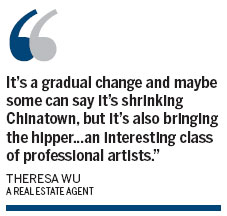
Landowners have been "land banking" for years, or buying properties to sell for profit in the future, said Andrew Leong, an associate professor of legal education and immigrant law at the University of Massachusetts Boston and an author of the AALDEF report. "This is their time now to cash in, so they will sell or partner with developers with deep pockets so that they can reap the benefits of being able to develop a luxury concierge building," he said.
Recognizing that land in Chinatown is valuable and that many of the low-income families cannot afford to pay the levels of rent that younger, more affluent professionals can, landlords are using different tactics to evict tenants, including ones that skirt legal gray area, he said.
Illegal subdivisions in Chinatown apartments have long existed, with multiple families cramped together in the same apartment, using makeshift dividers to carve up space. Landlords have known that these subdivisions existed, Leong said, but never went about enforcing any rules.
"But now all of a sudden, the landlords say, 'Hey, that's illegal!' And so they're bringing in housing inspection, and they've been doing that since the 2000s and onwards because of the escalation of land values. They're making the city of New York enforce its overcrowding provisions in order to evict the tenants," he said. Housing inspectors don't question landlords how long they've known of these illegalities, and become "merely agents of eviction for the landlords," he added.
Some other landlords use scare tactics to get tenants to leave, he said. They hire "consultants" who are lying to tenants to get rid of them, according to Chan of the Chinatown Tenants Union.
Intimidating people
"New York City housing law protects anybody, regardless of immigration status. But you have these consultants who will go and say 'You need documents to be able to live here and if you don't produce them, you have to leave.' If you're new to the country and you don't know these things, then you'll obviously be intimidated by these folks," he said.
The Chinatown Tenants Union works with immigrant tenants to help them understand what's legal and what's not, but information on housing laws and tenant rights is often only available in English. Some immigrants aren't even aware that they had laws protecting them, and out of fear often oblige landlords' evictions and try to move elsewhere.
Despite the rapid pace of changes in Chinatown, some, like real estate agent Wu, say there are benefits.
"There are newer, more expensive restaurants opening in the area, but there are also Chinese-American and Chinese-owned ones opening as well," she said. "I think you always have to see both sides. I definitely agree rents all around are coming up, but we also have to think about why it's happening and does it make sense for the neighborhood," she said. "It's actually redefining and pulling Chinatown together, and telling a different [story], because Chinatown has always been seen as the last neighborhood you talk about, but now people are going there for restaurants and cafs."
Chinatown will never be one of the top three or even top-five Lower Manhattan residential areas, Wu said, but the hybrid of Chinatown pricing and increasing availability of new shops and restaurants makes it an attractive place for new renters, which is ultimately good for a neighborhood, she said.
"When you have that in mind, balancing the fact that you can still get wonton soup for $5 and [then also] cleanse juices and a meal, it creates an interesting community. It's not for everyone, but that's becoming the new Chinatown. It's reshaped the Chinatown," Wu said.
But others question what benefits a new Chinatown can give its residents.
Washington's Chinatown is the Chinatown that Leong said he and others fighting against gentrification fear New York and other Chinatowns will become: "an exotic Disneyland location for the well to do," with no real community where "real people, working class people can live and work".
Chinatown residents being displaced affects more than just Chinese immigrants and the community, Leong said. People don't think about how displacement in one neighborhood has a larger impact on the city and country at large, but it does, he said.
"On a societal basis, in the end, we still pay the cost, because at the same time we see gentrification happening and displacement happening, there's a direct correlation to homelessness," he said. "We're still going to have to grapple with homelessness. For some reason, people totally disconnect that from rent-control laws, from gentrification, from displacement.
"One of the things I'm trying to promote is to look at things in a much more holistic manner, and not to say, 'We only have to look at gentrification. We only have to look only at rent control.' We have to look at things in a multiple-issue orientation."
Contact the reporter at amyhe@chinadailyusa.com
|
A site on one of Chinatown's main streets will be the home of a 22-story hotel by 2015, which will replace what was a Chinese restaurant. Photos by Amy He / China Daily |
|
Signs on a small business, which like many others in Chinatown, face rising rents. |
(China Daily USA 01/17/2014 page19)
Most Viewed
Editor's Picks

|

|

|

|

|

|
Today's Top News
Xi extends Lunar New Year greetings
Ambassador nominee vows to expand China ties
HK slaps sanctions on Manila
More Chinese set to travel overseas
Lenovo makes move on Motorola
China-themed malls a new trend in the Bay area
Replace dollar with super currency
Japan should learn from Germany
US Weekly

|

|
